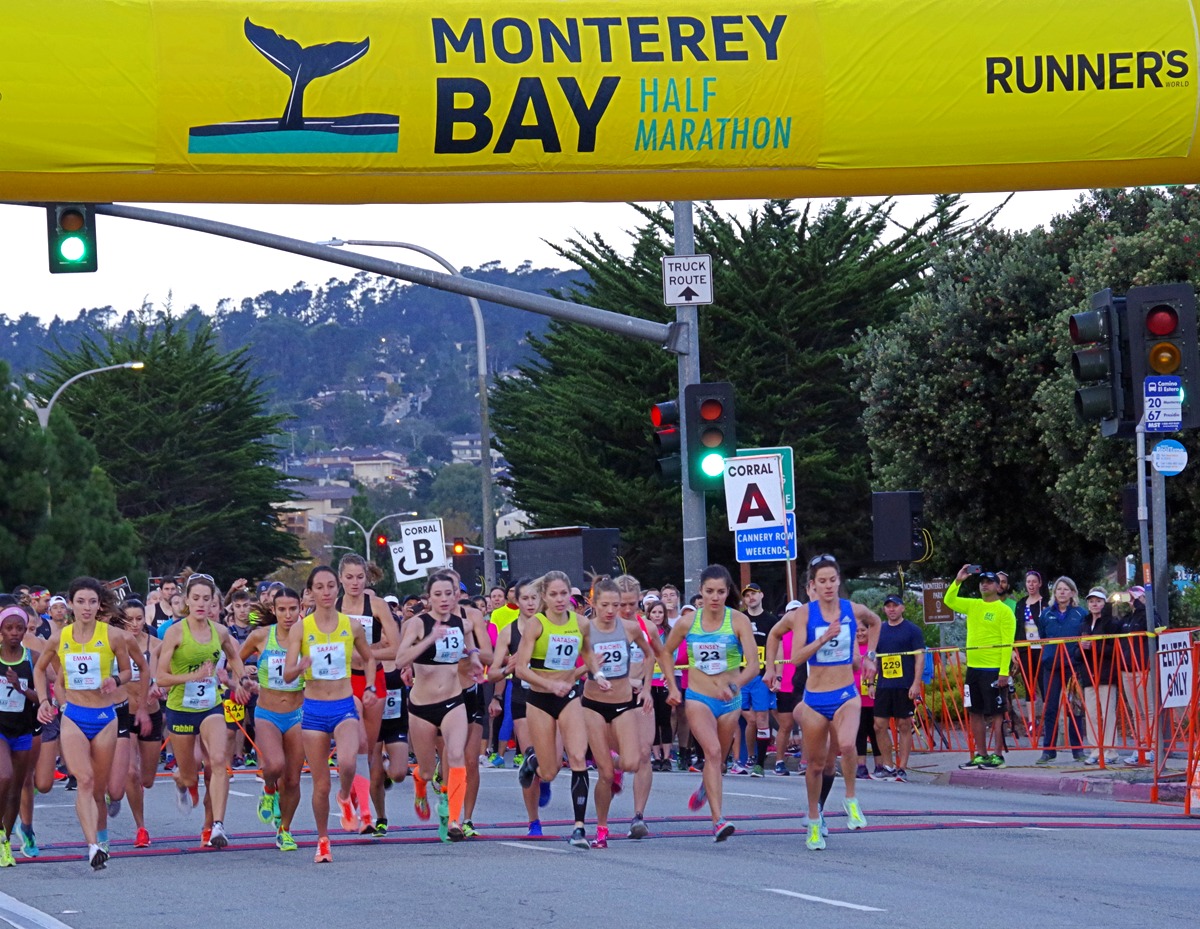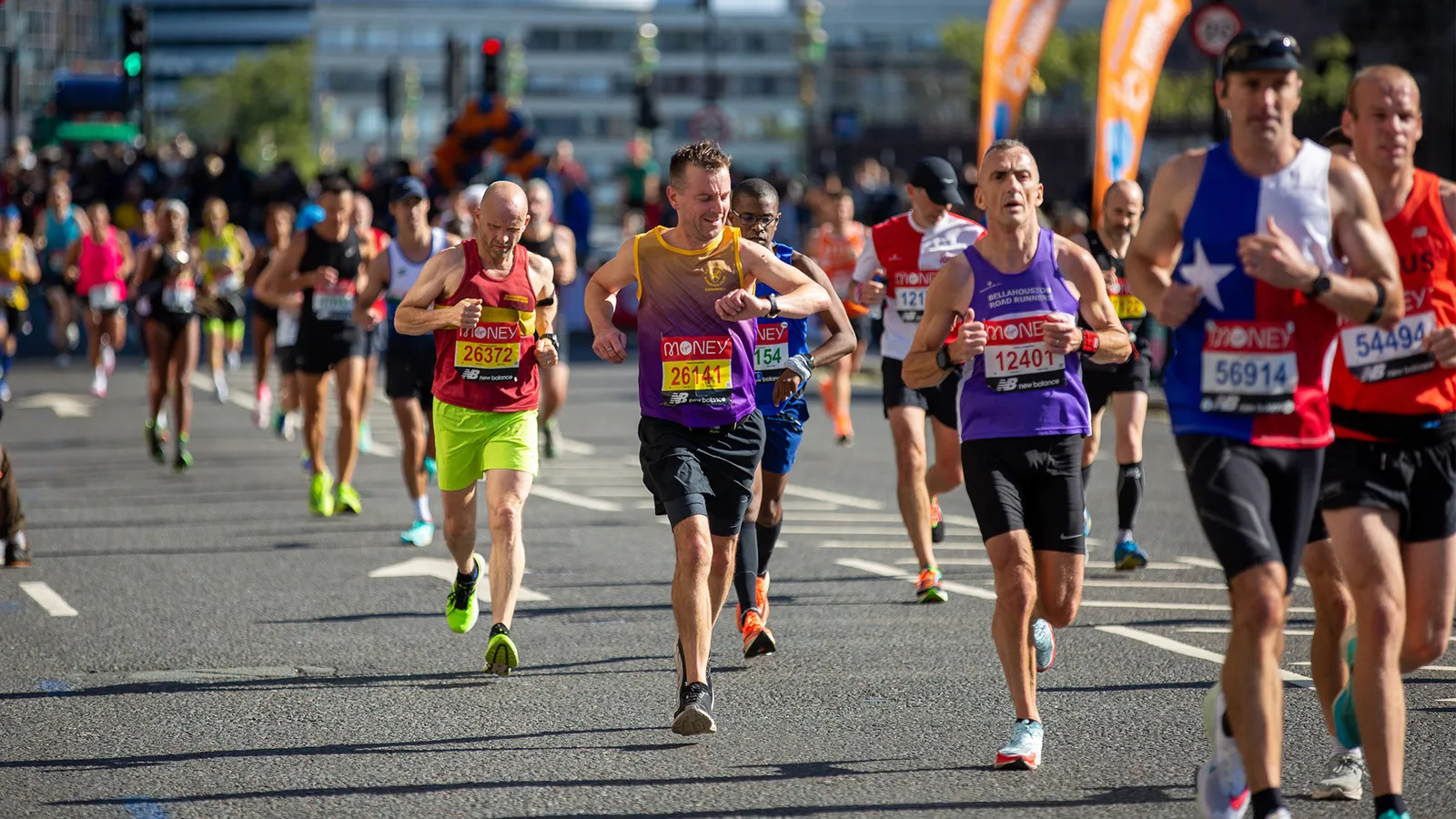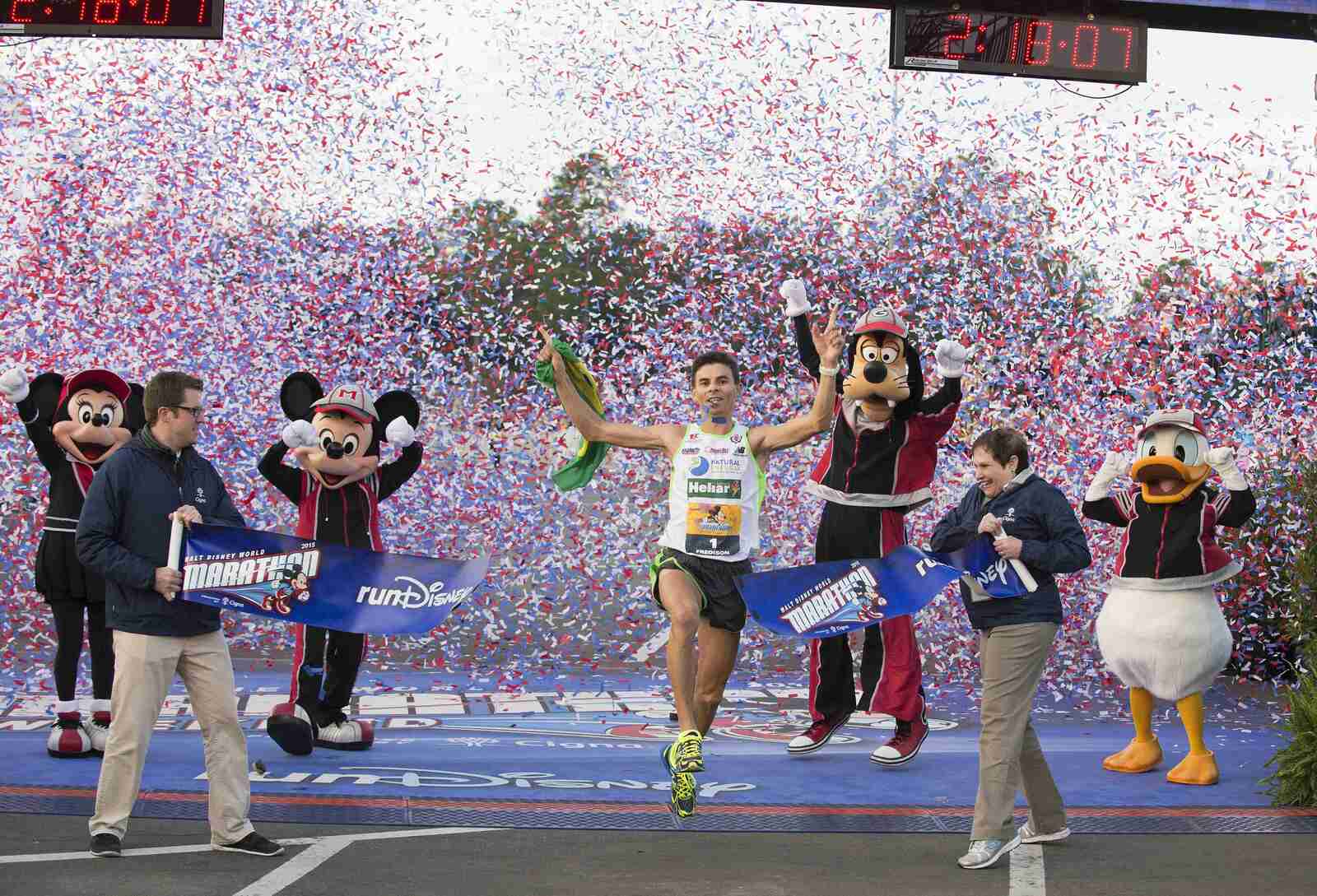Home>Misc>Featured>How To Estimate Half Marathon Finish Time


Featured
How To Estimate Half Marathon Finish Time
Modified: August 21, 2023
Estimate your featured half marathon finish time with our step-by-step guide. Learn how to set realistic goals and improve your performance.
Introduction
Welcome to the exciting world of half marathons! Whether you are a seasoned runner or just starting out on your fitness journey, participating in a half marathon is a fantastic way to challenge yourself and achieve personal goals. However, before you take on this 13.1-mile journey, it is crucial to have an estimation of your finish time. Understanding your expected finish time will help you set realistic goals, plan your training program, and ensure a successful race day experience.
Estimating your finish time for a half marathon may seem like a daunting task, especially if you are new to the sport. It requires careful consideration of various factors, such as your current fitness level, running experience, and training regimen. In this article, we will guide you through the process of estimating your half marathon finish time, providing both basic and advanced techniques to help you make an accurate estimation.
Before we delve into the methods, let’s first understand why estimating your half marathon finish time is so important. Having a realistic expectation of your finish time allows you to:
- Set achievable goals: Estimating your finish time helps you set specific, realistic goals for your training program. This ensures that you are pushing yourself without setting unrealistic expectations.
- Create a training plan: Knowing how long it will take you to complete the race helps you design an effective training plan. This plan can include workouts, long runs, speed work, and rest days, all tailored to help you reach your desired finish time.
- Strategize during the race: With an estimated finish time in mind, you can plan how you will pace yourself during the race. This can prevent you from starting too fast and burning out early, or help you push harder in the later stages if you are aiming for a specific time goal.
- Stay motivated: Setting a target finish time provides a source of motivation throughout your training. As you see yourself getting closer to your goal, it encourages you to keep pushing and stay dedicated.
Now that we understand the importance of estimating your half marathon finish time, let’s explore the factors that can influence your performance.
Importance of Estimating Finish Time for a Half Marathon
Estimating your finish time for a half marathon is not just a matter of curiosity; it has practical implications that can greatly enhance your race day experience. Let’s explore some reasons why estimating your finish time is crucial:
Setting Realistic Goals: Estimating your finish time helps you set realistic goals for yourself. It allows you to understand your current capabilities and ensure that your goals are challenging yet attainable. Setting unrealistic goals can lead to disappointment and frustration, while setting achievable goals fuels motivation and confidence.
Designing a Training Plan: Knowing your estimated finish time enables you to design an effective training plan. A well-structured plan will include appropriate mileage, speed workouts, strength training, and rest days tailored to your goals. By aligning your training with your estimated finish time, you improve your chances of reaching your desired outcome on race day.
Pacing Strategies: Estimating your finish time helps you develop effective pacing strategies during the race. Pacing is crucial to maintain a steady performance throughout the course, avoiding the common mistake of starting too fast and burning out before the finish line. By understanding your estimated finish time, you can divide the race into manageable sections and adjust your pace accordingly.
Mental Preparation: Estimating your finish time provides mental preparation for the challenges you may face during the race. Knowing the approximate duration of the race allows you to visualize different scenarios and mentally prepare for setbacks or difficult moments. This mental preparation helps you stay focused, motivated, and resilient, even when faced with fatigue or unexpected obstacles.
Managing Expectations: Estimating your finish time helps manage your own expectations as well as those of your friends, family, or running partners. Communicating your goal time to others can prevent unrealistic expectations or undue pressure. This way, everyone involved can provide the appropriate support and encouragement throughout your training and on race day.
Celebrating Achievements: Estimating your finish time gives you a benchmark by which you can measure your progress and celebrate your achievements during and after the race. Achieving your estimated finish time or surpassing it can be incredibly rewarding, boosting your confidence and motivation for future races.
Estimating your finish time for a half marathon is an essential step in your race preparation. It allows you to set realistic goals, design an effective training plan, develop pacing strategies, mentally prepare for the race, manage expectations, and celebrate your achievements. Taking the time to estimate your finish time will enhance your overall race day experience and increase your chances of reaching your full potential.
Factors Affecting Half Marathon Finish Time
When estimating your half marathon finish time, it’s important to consider various factors that can impact your performance. These factors can vary from person to person and can significantly influence your race day experience. Let’s explore some of the key factors affecting half marathon finish time:
Running Experience: Your level of running experience plays a crucial role in determining your finish time. Experienced runners may have a better understanding of their pace, endurance, and race strategies, allowing them to perform more consistently. On the other hand, novice runners may need to focus on building a strong foundation and gaining race experience.
Training Regimen: The quality and consistency of your training can greatly impact your half marathon finish time. A well-structured training plan that includes a mix of endurance runs, speed work, strength training, and recovery days can improve your overall fitness and prepare your body for the demands of the race. Dedication to your training and following a progressive plan will increase your chances of achieving your desired finish time.
Current Fitness Level: Your current fitness level is another important factor to consider. Factors such as cardiovascular fitness, muscular strength, and flexibility can influence your running performance. Regular cross-training and incorporating strength and flexibility exercises into your training routine can enhance your overall fitness, potentially leading to a faster finish time.
Course Terrain and Elevation: The terrain and elevation profile of the course can have a significant impact on your half marathon finish time. Hilly or challenging terrains can slow down your pace, while flat and fast courses can potentially lead to quicker finish times. Researching the course and training on similar terrains can help you mentally and physically prepare for the challenging sections.
Weather Conditions: Weather conditions can greatly affect your race day performance. Extreme heat, high humidity, strong winds, and cold temperatures can increase fatigue, dehydration, and potentially slow down your pace. Monitoring the weather forecast and adapting your race strategy accordingly can help you overcome these challenges and optimize your performance.
Fueling and Hydration: Proper nutrition and hydration during training and on race day impact your performance. The fuel you provide your body before, during, and after the race can affect your energy levels, endurance, and overall race performance. Developing a fueling and hydration strategy that suits your body’s needs can help you sustain your pace and prevent fatigue during the race.
Mental Preparedness: Your mental state plays a significant role in your half marathon finish time. Having a positive mindset, staying focused, and practicing mental resilience can help you overcome fatigue and discouragement during the race. Incorporating mental training techniques such as visualization, positive self-talk, and setting small goals can improve your mental preparedness and help you achieve your desired finish time.
Remember that these factors interact with one another, and the impact of each factor will vary from person to person. Understanding how these factors can influence your performance is essential in making an accurate estimate of your half marathon finish time. By taking these factors into account, you can set realistic goals and tailor your training program to reach your full potential on race day.
Basic Method to Estimate Half Marathon Finish Time
Estimating your half marathon finish time is essential for setting goals and planning your training program. While there are various methods available, the following basic method can help you make an initial estimate:
Step 1: Determine Your Current Pace: Start by determining your current running pace. This can be done by tracking your time for a recent race, time trial, or a long training run. Record the time it takes you to cover a known distance, such as a 5K or 10K. Make sure to run at your intended half marathon pace during this test.
Step 2: Calculate Your Average Pace: Calculate your average pace by dividing the total time taken for the race or training run by the distance covered. For example, if you ran a 10K in 1 hour and 5 minutes, your average pace would be 6 minutes and 30 seconds per kilometer (or mile, depending on your preference).
Step 3: Determine Your Half Marathon Distance: As the name suggests, a half marathon is 13.1 miles or 21.1 kilometers. Use this distance to calculate your estimated finish time based on your average pace. Multiply your average pace per kilometer/mile by 21.1 to get an estimate of your finish time.
Step 4: Adjust for Factors: Remember that the basic method provides a rough estimate and does not take into account factors like course terrain, weather conditions, or fatigue. You can make adjustments to your estimated finish time based on these factors. For example, if the course is hilly, you may add extra minutes to your estimated finish time to account for the additional effort required.
Keep in mind that the basic method is a starting point for estimating your finish time. It provides a general idea but may not reflect your true potential. As you progress in your training and gain more race experience, you may need to refine your estimate using more advanced techniques.
It’s important to note that estimating your finish time is not set in stone. It’s merely a guide to help you set goals and prepare for the race. Your actual performance on race day can be influenced by various factors, including your fitness level, race strategy, and mental state.
Additionally, using a race pace calculator or consulting with experienced runners and coaches can provide valuable insights into estimating your half marathon finish time. These resources take into consideration more factors and can provide a more accurate estimation based on your specific circumstances.
Ultimately, estimating your half marathon finish time is a valuable tool that helps you plan your training, set goals, and mentally prepare for the race. Using the basic method as a starting point, you can make an informed estimate and adjust as necessary throughout your training journey.
Advanced Techniques to Estimate Half Marathon Finish Time
While the basic method provides a starting point for estimating your half marathon finish time, there are more advanced techniques available that can provide a more accurate estimation. These techniques take into account additional factors and can help fine-tune your estimated finish time. Let’s explore a few advanced techniques:
Training Runs at Race Pace: Incorporating training runs at your goal race pace is an effective way to gauge your fitness level and estimate your finish time. Plan dedicated workouts where you run at your intended half marathon pace for a sustained distance or duration. Your performance during these runs can provide invaluable insights into your potential finish time.
Progressive Long Runs: Progressive long runs involve gradually increasing your pace over the course of a long run. Begin at an easy pace and gradually pick up the speed, finishing the last few miles of your long run at your desired half marathon pace. This not only builds endurance but also gives you a sense of how it feels to maintain pace during the latter stages of the race.
Race Simulations: Mimicking race conditions during your training can help you estimate your finish time more accurately. Choose a training run or race that is similar in length to a half marathon and run it at your goal pace. This simulation allows you to experience the physical and mental demands of the race and assess your performance against your desired finish time.
V02 Max Testing: V02 max testing is a scientific method used to measure your maximum oxygen uptake, which is a key indicator of your aerobic capacity. This test can provide valuable data on your fitness level and help estimate your half marathon finish time. Consult with a sports scientist or exercise physiologist to undergo V02 max testing and receive an accurate estimation based on your results.
Race Predictor Calculators: Utilize online race predictor calculators that take your recent race times or training run data and provide a projected finish time for the half marathon. These calculators use mathematical algorithms and statistical models to estimate your finish time based on previous performances. While not foolproof, they can provide a quick estimation based on your current fitness level.
Coach or Expert Consultation: Seeking guidance from an experienced running coach or expert can significantly assist in estimating your half marathon finish time accurately. They can evaluate your training program, assess your fitness level, and analyze historical race results to gauge your potential. Their expertise and knowledge of the sport can provide valuable insights into setting realistic goals and estimating your finish time.
By incorporating these advanced techniques, you can refine your estimated half marathon finish time and gain a better understanding of your capabilities as a runner. Remember, however, that these techniques are meant to guide and inform your estimation, and race day variables can still impact your performance. Be open to adjusting your estimate as necessary, and trust your training and preparation on race day.
Estimating your half marathon finish time is a valuable part of your race preparation. Utilizing advanced techniques alongside the basic method can provide a more accurate estimation based on your individual circumstances. These techniques help you set realistic goals, plan your training, and mentally prepare for the race, ultimately increasing your chances of achieving your desired finish time.
Common Mistakes to Avoid While Estimating Half Marathon Finish Time
Estimating your half marathon finish time is a crucial step in preparing for the race. However, there are common mistakes that novice and even experienced runners make when estimating their finish time. Being aware of these mistakes can help you avoid them and make a more accurate estimation. Let’s explore some common mistakes to avoid:
Underestimating or Overestimating Abilities: One common mistake is underestimating or overestimating your running abilities. It’s important to have a realistic assessment of your fitness level and race experience. Overestimating your abilities may lead to setting unrealistic goals, while underestimating may result in not challenging yourself enough. Make an honest evaluation of your capabilities to set achievable and meaningful goals.
Not Considering Course Terrain and Conditions: Failing to consider the course terrain and weather conditions can lead to inaccurate finish time estimations. A hilly course or adverse weather conditions can significantly impact your pace. Research the course, study elevation profiles, and take into account the expected weather conditions on race day to adjust your estimated finish time accordingly.
Ignoring Personal Factors: Each runner is unique, and personal factors must be taken into account when estimating finish time. Factors such as age, previous injuries, current fitness level, and available training time should be considered. Ignoring these personal factors can lead to unrealistic expectations or failing to account for potential limitations or challenges.
Not Accounting for Pacing Strategy: Neglecting to consider pacing strategy can affect your estimated finish time. It’s crucial to determine your desired pace and plan how you will maintain it throughout the race. Starting too fast or failing to adjust your pace can negatively impact your performance. Consider your training runs, split times, and race simulations to make an informed estimate.
Not Adjusting for Training Progression: Failing to account for training progression can lead to inaccurate estimations. As you progress through your training program, your pace and endurance will likely improve. Check your progress during training runs and adjust your estimated finish time accordingly to reflect your improvements accurately.
Overlooking Mental Preparedness: Mental preparedness plays a significant role in your race performance. Underestimating the mental challenges during a half marathon can impact your finish time. Mental fatigue, lack of focus, and negative self-talk can hinder your performance. Prepare mentally by incorporating visualization techniques, positive affirmations, and mental resilience exercises into your training regimen.
Not Reevaluating as Race Day Approaches: Lastly, failing to reevaluate your estimated finish time as race day approaches is a common mistake. Your training progress, race-day conditions, and overall readiness can change. Continuously reassess your estimated finish time based on these factors to account for any changes that may affect your performance.
Avoiding these common mistakes will help you make a more accurate estimation of your half marathon finish time. Be realistic about your abilities, consider course terrain and conditions, take personal factors into account, plan your pacing strategy, adjust for training progression, prepare mentally, and reevaluate as necessary. By doing so, you will set yourself up for success and increase the likelihood of achieving your desired finish time.
Training Tips for Achieving Your Estimated Half Marathon Finish Time
Once you have estimated your half marathon finish time, it’s time to focus on your training to ensure that you can achieve your goals on race day. Here are some training tips to help you prepare and improve your chances of reaching your estimated finish time:
Create a Structured Training Plan: Building a well-structured training plan is essential for success in a half marathon. Incorporate a mix of running workouts such as long runs, tempo runs, speed work, and recovery runs. Gradually increase your mileage and intensity over time, allowing your body to adapt and improve.
Consistency is Key: Consistency in your training is crucial for achieving your desired finish time. Stick to your training plan as closely as possible and make running a regular part of your routine. Missing too many workouts can hinder your progress, while consistent training helps build the necessary endurance and stamina required.
Focus on Building Endurance: Half marathons require a strong aerobic base. Focus on building your endurance by gradually increasing your long run distance. Aim to complete several long runs at or near your estimated race pace to develop the necessary stamina to sustain your pace for the entire race distance.
Include Speed Workouts: Incorporate speed workouts into your training to improve your running pace. Tempo runs, interval training, and fartlek workouts can help increase your speed and efficiency. These workouts also provide mental focus and simulate race-day conditions.
Practice Race Pacing: Make it a point to practice running at your estimated race pace during training. This will help you familiarize yourself with that pace, improve your ability to maintain it, and give you confidence in your abilities. It will also help you gauge how your body responds to that specific pace.
Simulate Race Conditions: Incorporating race simulations into your training can better prepare you for race day. Participate in a few mock races or time trials to simulate the race atmosphere. This allows you to practice your pre-race routine, test your pacing, and deal with any race-day nerves.
Listen to Your Body: Pay attention to your body’s signals during training. Push yourself, but also know when to rest and recover. Overtraining can lead to burnout and injuries, so be mindful of maintaining a balance between hard work and adequate recovery.
Include Cross-Training: Engage in cross-training activities to supplement your running. Activities such as strength training, yoga, cycling, or swimming can improve your overall fitness, prevent injury, and increase your body’s functional strength.
Practice Fueling and Hydration: Experiment with different fueling and hydration strategies during your long runs to determine what works best for you. Proper nutrition and hydration are essential for maintaining your energy levels and preventing fatigue during the race.
Believe in Yourself: Building mental resilience is just as important as physical preparation. Believe in your training, trust your abilities, and stay positive. Visualize yourself achieving your goals and overcome any self-doubt that may arise along the way.
Remember to adapt these training tips to your individual needs and abilities. Everyone is different, so listen to your body, seek guidance from a coach or experienced runners, and make adjustments as necessary. By following a well-rounded training plan, focusing on key areas such as endurance, speed, and race pacing, and taking care of your physical and mental well-being, you will increase your chances of achieving your estimated half marathon finish time on race day.
Conclusion
Estimating your half marathon finish time is an integral part of your race preparation. It helps you set realistic goals, plan your training effectively, and mentally prepare for the challenges ahead. By considering factors such as your running experience, training regimen, and current fitness level, you can make a more accurate estimation.
While the basic method provides a starting point, incorporating advanced techniques like training runs at race pace, progressive long runs, and race simulations can refine your estimation further. Additionally, tools such as V02 max testing and race predictor calculators can provide additional insights.
Avoid common mistakes like underestimating or overestimating your abilities, ignoring course terrain and conditions, and not adjusting for personal factors. By being aware of these pitfalls, you can make a more accurate estimation.
The training phase is vital in achieving your estimated finish time. Focus on building endurance, incorporating speed workouts, practicing race pacing, and listening to your body’s needs. Remember to include cross-training activities, practice fueling and hydration strategies, and nurture your mental resilience throughout your training journey.
Ultimately, your half marathon finish time estimation is a guideline to help you set goals and prepare for the race. But on race day, factors like weather conditions, course challenges, and your mental state may influence your performance. Adapt your strategy as needed and trust in your preparation.
As you strive to achieve your estimated half marathon finish time, remember to enjoy the journey. Embrace the challenges, celebrate your milestones, and appreciate the incredible accomplishment of completing a half marathon. Whether you surpass your estimated time or fall slightly short, the dedication and effort you put into your training will make you a stronger and more confident runner.
Now, armed with the knowledge and techniques provided in this article, go out and conquer that half marathon, knowing that you have the tools to estimate your finish time and achieve your goals! Good luck!









